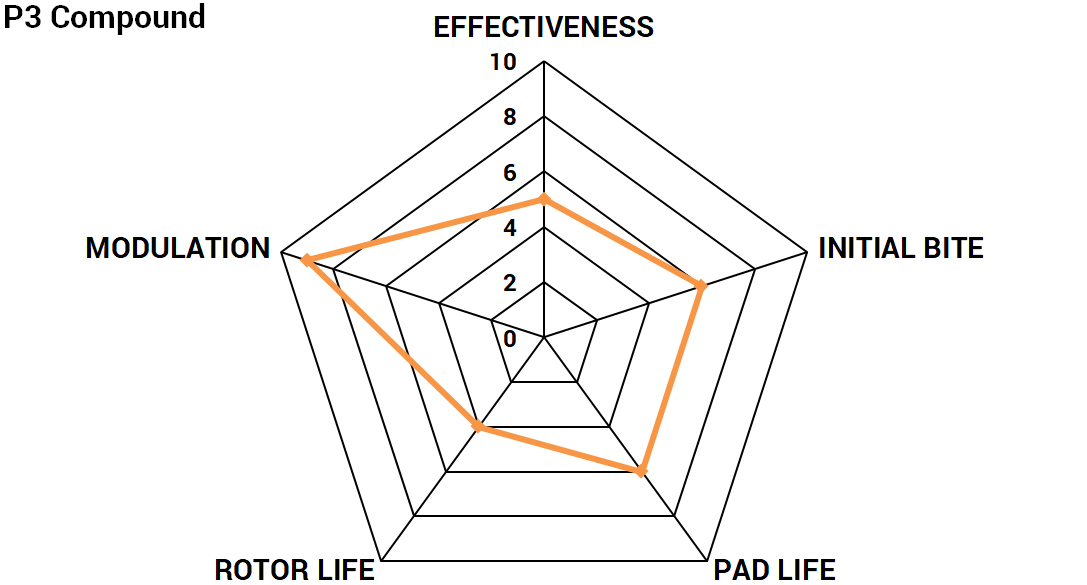Street Compound:
P2 Compound
The P2 “Sport Comfort” compound is designed for street use where balance between performance and street friendliness is emphasized. Minimal brake dust and noise due to its non-metallic material. Improved initial bite, modulation (brake control), and temperature range over stock pads. Higher coefficient of friction for increased stopping power. Excellent pad and rotor life. Works as designed from ambient temperature. Ideal for daily driven vehicles with performance in mind.

- Material: Non-metallic
- Effective temperature range: Ambient - 932°F (500°C)
- Average Mu: 0.29 ~ 0.32
- Recommended for street use only
- Comparable to: Hawk HPS, Project Mu B Spec
Street / Track Compound:
P3 Compound
The P3 “Road & Track” compound is an all round compound ideal for sport driving, autocross, and light track duty while still maintaining street drivability. Low level of brake dust and noise. Good coefficient of friction, initial bite, and temperature range make this compound capable for track conditions. Best modulation and control characteristics among P series compounds. Great choice for occasional track vehicles without the disadvantages of dedicated track pads. Works as designed from ambient temperature. Great rear pad option for those who prefer a more front biased setup with the R5 compound up front.

- Material: Semi-metallic
- Effective temperature range: Ambient - 1112°F (600°C)
- Average Mu: 0.34 ~ 0.37
- Recommended for street / track use
- Comparable to: Ferodo DS2500, Endless MXRS & MX72, Project Mu HC+, PFC 97, Hawk HP+, Pagid RS4-2
Track / Race Compound:
R5 Compound
The R5 “High Friction Track / Competition” compound is designed as a dedicated track compound. High coefficient of friction provides sufficient stopping power for track and competition conditions. Precise modulation and release characteristics. Highly fade resistant with wide temperature range. Flatter torque curve compared to the R7 compound, providing consistent and solid braking performance throughout the effective temperature range which boosts driver’s confidence. Elevated noise and brake dust compared to P2 and P3 compounds. Relatively easy on rotors compared to competitors’ racing pad offerings. Great front pad option for lighter cars, and rear pad option for those who prefer a more front biased setup with the R7 compound up front.

- Material: Metallic
- Effective temperature range: 212°F - 1382°F (100°C - 750°C)
- Average Mu: 0.40 ~ 0.43
- Recommended for track use
- Comparable to: Endless CC38(ME22) & CC-Rg, Project Mu Club Racer & Racing 777, Ferodo DSUNO & DS3000 , Cobalt XR3 & XR4, Pagid RST3, RS44 & RS19, CL RC6
R7 Compound:
The R7 “Maximum Friction Track / Competition” compound is a full race compound with maximum coefficient of friction. With higher stopping power and maximum effective operating temperature, the R7 compound is ideal for advanced high speed track events, competitions, and heavier cars that require maximum braking performance. Good modulation and release characteristics. Excellent pad and rotor life. Higher fade resistance compared to the R5 compound, with solid pedal feel throughout the effective temperature range.

- Material: Metallic
- Effective temperature range: 212°F - 1562°F (100°C - 850°C)
- Average Mu: 0.48 ~ 0.53
- Recommended for track use only
- Comparable to: Endless CC60(N30C), Cobalt XR1 & XR2, Pagid RS29, Ferodo DS3000+
***Track and race pads are not recommended to be used on streets due to elevated brake dust and noise level, possibly higher pad and rotor wear during low speed brake events, and being not able to work 100% as designed at ambient temperature. If these downsides of dedicated track and race pads are not an issue, they can be used on streets absolutely fine.
Comparison charts for Paragon brake pad compounds:









